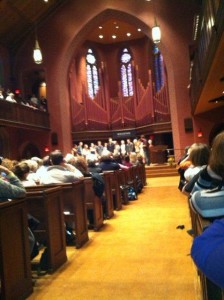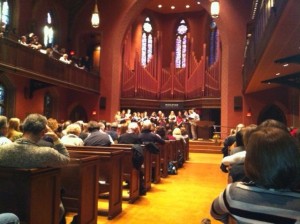This past weekend I got to spend some time with two young alumni who are fearlessly working to change the world. Kennedy Odede ’12 and Jessica Posner Odede ’09 were back on campus (Kennedy is a trustee), taking a brief break from their leadership of Shining Hope for Communities. The two founded this organization when they were undergraduates, beginning with a school for girls and then a women’s health clinic in Kibera, Kenya.
Kari and I had seen them on television a couple of weeks ago in a segment of the PBS documentary A Path Appears. The film, created by Nick Kristof and Sheryl Wudunn, documents the work of change agents in various parts of the world. We were particularly moved by footage of the women’s health clinic, named after Johanna Justin Jinich ’10, a Wesleyan student who was murdered almost six years ago. Johanna’s memory is not only kept alive — her spirit of care and energy is reinforced every day in Shining Hope’s good work in Kibera.
Here is a brief clip from the organization:
[youtube]https://www.youtube.com/watch?v=R_qR528LfR8#t=69[/youtube]
Jessica and Kennedy were talking with Bob Patricelli ’61, P’88, P’90, who has been key to establishing the Center for Social Entrepreneurship named in his honor. Many Wesleyan students at the Patricelli Center are learning the skills they need to build sustainable organizations that will make a positive difference in the world. They will be joining a long tradition of Wesleyan students who turned their education toward “the good of the world.”
You can find A Path Appears on iTunes, and you can learn more about Shining Hope for Communities here and here.





